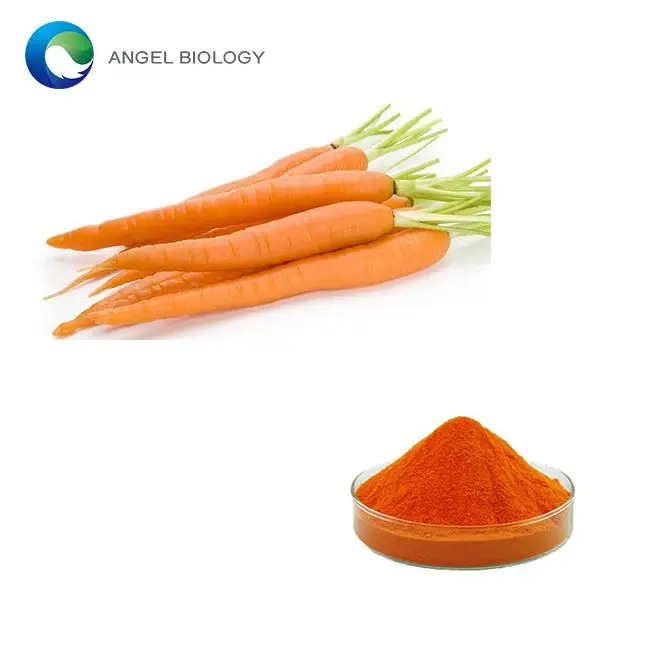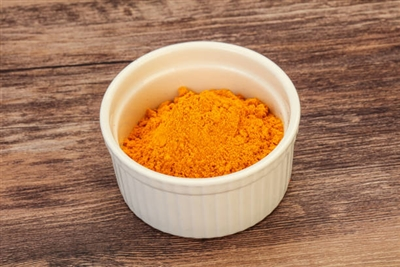Can too much beta-carotene be harmful ?
The Potential Risks Of Excess Beta-Carotene Intake
Beta-carotene is a red-orange pigment found naturally in many colorful fruits and vegetables. As a carotenoid compound and precursor of vitamin A, beta-carotene offers important health and nutritional benefits. However, there have been some concerns about potential adverse effects from overconsuming highly concentrated supplemental sources of beta-carotene, especially in powdered form. This article explores the science behind excess beta-carotene intake and if it can truly be harmful.

Beta Carotene Powder
Cas No.: 7235-40-7
Country of Origin: China
Certifications: ISO9001, Kosher,Halal, FDA, IFEAT
Packing Size: 25kg/drum
Delivery Terms: EXW, FOB, CIP, CIF, DAP
Transportation: Courier, Air, Ocean
Payment Terms: T/T preferred
Delivery: Ready stock, Prompt and Secure Shipment
Free Sample: Available
OEM/ODM: Available
MOQ: 1kg
Discount for large orders
Not for Private Person Sale
The Roles And Sources Of Beta-Carotene
Beta-carotene is best known as an antioxidant that can boost immunity and help maintain healthy vision, skin, growth, and development. The human body also converts beta-carotene into retinol, the active form of vitamin A. Some of the richest dietary sources of beta-carotene include sweet potatoes, carrots, spinach, mangoes, broccoli, red bell peppers, apricots, and tomatoes.
To increase beta-carotene content in processed foods and supplements, manufacturers extract and concentrate pure beta-carotene from natural sources or synthetically produce crystalline beta-carotene for bulk powder applications. These highly concentrated beta-carotene ingredients deliver much more than could be obtained from normal fruits and vegetables in the diet.

While most carotenoids cannot be formed by the human body so must come from plant-based foods, beta-carotene is unique in also being produced within animals, fungi and microorganisms that ingest it. Humans and other mammals have the enzymatic capacity in intestinal cells and liver tissue to metabolize beta-carotene into activated vitamin A. This internal beta-carotene conversion to retinol illustrates the importance of this carotenoid to human health.
Potential Adverse Effects Of Too Much Beta-Carotene
While beta-carotene from a balanced diet is not associated with toxicity, there is controversy regarding excessive intakes from supplements. Some studies have linked high beta-carotene blood levels due to supplements with increased disease risk in certain populations, including smokers and asbestos workers.
Proposed reasons why high supplemental doses of beta-carotene may be harmful include:
Prooxidant Effects - In certain conditions, excessive beta-carotene can lose its antioxidant behavior and promote oxidative stress leading to cellular damage.
Competitive Absorption - High beta-carotene intake can interfere with absorption of other important carotenoids like lycopene and lutein as they compete for uptake via similar intestinal absorption mechanisms.
Vitamin A Overload - Excess beta-carotene from supplements gets converted to vitamin A, leading to hypervitaminosis A and associated toxicity risks like liver dysfunction, bone softening, nerve compression and birth defects.
Reduced Immunocompetence - While moderate doses benefit immunity, very high levels of beta-carotene supplements may suppress immune cell responsiveness possibly worsening disease outcomes.
Carotenodermia - Although harmless, excess circulating beta-carotene can temporarily shift skin color towards orange due to carotenoid deposition and retention.
However, research data remains contradictory regarding the exact threshold where beta-carotene shifts from being beneficial to harmful. Much also depends on whether supplemental doses come from natural or synthetic beta-carotene sources.
Studying Safety Of Bulk Beta-Carotene Powders
For the food, supplement, and cosmetic industries, beta-carotene is widely used to provide coloration, nutrition, and antioxidant functionality. Bulk beta-carotene powders concentrated to 5-15% purity allow flexible use across diverse products. But with increasing beta-carotene content comes questions of safe dosage ranges.
Research trials have used pure synthetic crystalline beta-carotene to test effects of supplementation at levels far exceeding normal dietary intakes. While these mega-doses can negatively impact lung health in smokers, they do not reflect actual consumption from using standard food-grade beta-carotene colorants. Still, prudent formulation practices are advised when working with ultra-concentrated bulk beta-carotene raw ingredients to provide a reasonable safety margin.
Recommended Safe Limits For Beta-Carotene Intake
The European Food Safety Authority (EFSA) has extensively reviewed data to publish comprehensive guidance on safe beta-carotene levels. Their health-based guidance puts forward:
An upper tolerable intake level of 7 mg beta-carotene per day from supplements for adults. Higher chronic intakes may increase risk of carotenodermia where skin temporarily takes on an orange hue due to carotenoid accumulation.
A temporary increase up to 14 mg beta-carotene per day from supplements is acceptable for short time periods of 4-6 weeks.
An upper limit of 2.4 mg per day from supplements for children age 1-3 based on body weight scaling. Older children and pregnant women have varying temporary upper limits around 7-9 mg per day.
Warnings to avoid beta-carotene supplementation completely for smokers, asbestos workers or people with alcohol risk disorders due to toxicity concerns.
Aside from supplements, average daily dietary intakes of beta-carotene are typically between 2-7 mg depending on vegetable and fruit consumption. Intakes from all sources should fall within advisable thresholds.
Appropriately Applying Beta-Carotene Colorants
Following proper formulation procedures and handling precautions allows food manufacturers to safely leverage beta-carotene’s advantages without worry of excess intakes. Beta-carotene use levels on the order of 0.003-0.3% by weight in finished products are not problematic, considering the resulting low per serving exposures.
As with any pigment or bioactive compound, recognizing beta-carotene’s potential to interact with other ingredients, processing conditions, and storage factors helps ensure quality and consistency. Suitability testing of beta-carotene colorant preparations across different food matrices can dial in accurate color tones and functional performance.
Encapsulation techniques may also be employed to boost stability of beta-carotene by embedding particles within protective matrices. The choice of encapsulating wall materials and shell characteristics can be tailored to desired release timing.
Finally, clear labeling helps identify products containing beta-carotene colorants for consumer awareness. Allergen and certified kosher/halal statements may also be prudent if beta-carotene sources fall outside consumer expectations.
Future Outlook On Beta-Carotene Supplementation
While evidence suggests reason for conservatism with beta-carotene isolate supplements, especially for smokers, the benefits of balanced intake from fruits and vegetables are unquestionable. Ongoing nutrition studies and risk profile refinements can provide more clarity on who might face problems with high-dose beta-carotene supplementation.
In the meantime, leveraging beta-carotene as a colorant to help people meet produce recommendations may offer the best of both worlds. Vibrantly hued foods and beverages colored with natural beta-carotene can make it easier to reach daily vegetable intake goals linked to decreased risk of chronic diseases.
Pairing beta-carotene fortification and enrichment strategies with public health campaigns can uncover innovative ways to exploit beta-carotene’s strengths while respecting its limitations. Consumer education around interpreting beta-carotene content on food labels could motivate increased vegetable and fruit selections.
Overall, applied in appropriate moderation with sound science supporting safety assessments, beta-carotene remains a powerful tool in health promotion efforts seeking to increase nutritional quality and visual curb appeal of our food supply.
If you want to get more information about plant extract powder, please email us at angel@angelbiology.com for more information!


